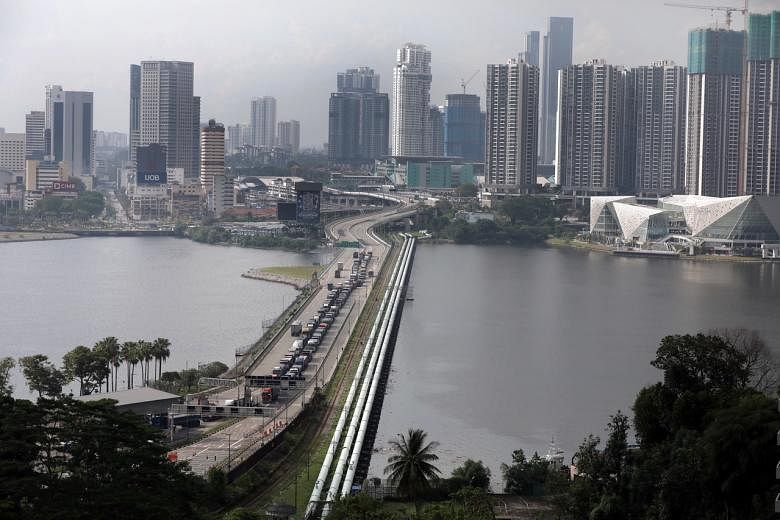SINGAPORE - From April 1, those who are fully vaccinated will be able to travel freely between Singapore and Malaysia by land, including by driving, without testing or quarantine, in a highly anticipated move that is set to kick-start short trips between the neighbouring countries.
On Thursday (March 24), Singapore and Malaysia jointly said that there will no longer be any need for pre-departure or on-arrival tests.
There will also no longer be any caps on the number of daily overland travellers - a major step up from the current arrangement where only about 4,000 people are allowed to travel on designated vaccinated travel lane (VTL) buses daily.
The new arrangement will apply to all categories of travellers and all modes of transport via the land border, including cross-border public bus services like service 170 that are being progressively restored.
All travellers must have valid travel documents like their passports and vehicle entry permits (VEP). Those crossing the Causeway - including Singapore citizens, permanent residents and long-term pass holders - must also complete their SG Arrival Card within three days before arriving at the checkpoints.
“Singapore and Malaysia enjoy deep, warm and multifaceted relations, as well as strong people-to-people ties. Today’s announcement is a significant milestone in our transition towards living with Covid-19,” said Prime Minister Lee Hsien Loong.
“It reflects the strong collaboration both sides have enjoyed throughout the pandemic and will help both countries emerge stronger from this crisis.”
Malaysian Prime Minister Ismail Sabri Yaakob noted that the opening will coincide with Malaysia’s opening of its borders to international travellers on April 1.
He added: “This will certainly contribute to the recovery efforts with positive impacts on the economies and livelihood of the peoples of both countries.”
The relaxing of curbs over movement between the two countries has been in discussion for a while, and it became more likely as the Omicron wave came down from its peak and as evidence emerged that it was less lethal.
The easing of Singapore-Malaysia border restrictions effectively returns movement between the two countries to much like it was before the pandemic, when 415,000 people crossed the Woodlands Causeway and Tuas Second Link daily.
This should give people who work across the border more confidence in returning to their jobs, say observers. Families that had been separated will no longer have to worry about scrambling for bus tickets to see one another.
It is also both countries’ hope that their tourism sectors will be given a much-needed boost.
Before the pandemic, Malaysian tourists were the seventh-biggest spenders in Singapore, just behind the United States and Japan and ahead of South Korea.
Among tourists in Malaysia, Singaporeans spent the most there - about $6.59 billion in 2019.
The Ministry of Trade and Industry urged people not to rush to travel “if they have no urgent need to do so”.
“As there might be a surge in travellers looking to cross the land borders, travellers should expect some traffic congestion at the checkpoints,” it said.
It added that non-fully vaccinated children aged 12 and below will also no longer have to take pre-departure and on arrival tests or serve a stay-home notice.
The Land Transport Authority (LTA) said foreign-registered vehicles entering Singapore can, from March 31, apply online for their mandatory vehicle entry permits and Autopass cards to pay tolls. They can do this via VEP Digital Services on LTA’s OneMotoring website.
People will not be able to apply for these at Singapore’s land checkpoints, and those who do not have either will be turned back to Malaysia.
“Travellers are advised to plan at least two weeks ahead of their intended travel dates to allow sufficient time for VEP application and approval,” LTA said.
There are currently 40,000 foreign-registered vehicles that have valid VEPs to Singapore. The permits are valid for 14 days but are renewable.
Associate Professor Walter Theseira of the Singapore University of Social Sciences said Singapore and Malaysia are critical markets for each other and that it is unlikely that either tourism industry will be able to recover without restoring pre-pandemic travel.
“It’s absolutely crucial for the day-to-day operation of our economy, as many of our supply chains for manufacturing, construction and consumer goods go through Malaysia,” he said.
“But the personal travel links are also vital, not just for tourism, but also for trade in services and business.
"Many Singapore-based firms have operations in Malaysia and used to depend on Singapore-based staff being able to routinely visit the Malaysia side.”
UOB economist Barnabas Gan said the land link is particularly important as it is still the most accessible way for people to travel between Singapore and Malaysia.
“The further relaxation of travel restrictions will likely facilitate tourism demand for both economies and, more importantly, rebuild the economic linkages for both economies to grow and expand, especially during the endemic Covid-19 period,” he said.
Speaking in Malaysia at the National Institutes of Health, Health Minister Ong Ye Kung said he and his Malaysian counterpart Khairy Jamaluddin will continue to update each other on the Covid-19 situation in both countries.
“Malaysia has done very well with its vaccination roll-out and preparing the country for the endemic phase, and I look forward to both our countries emerging stronger from the pandemic,” he said.


